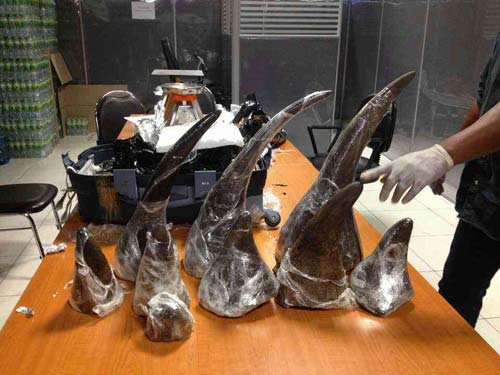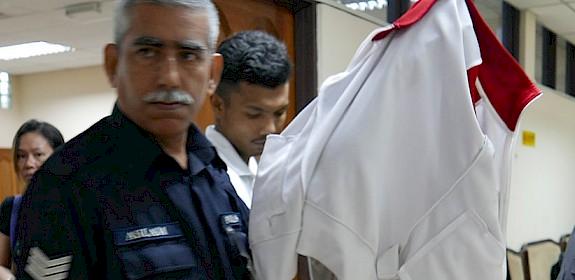Singapore and Thailand Customs each seize 22 kg rhino horn
20th January 2014–Customs officers in Singapore and Thailand have both recorded significant rhino horn seizures within a few days of one another. In each instance, close to 22 kg rhino horn were seized from the luggage of passengers on their way to Viet Nam.

On 10th January, Customs in Singapore seized eight pieces of smuggled Black Rhinoceros horn from a man’s checked baggage at Changi Airport. Reports indicate that the horn pieces, with a combined weight of almost 22 kg, were discovered while the passenger was in transit to his native Viet Nam, where rhino horns are primarily used as a status symbol and health tonic. He was tried and convicted on 16th January, and sentenced to 15 months in prison.
In a remarkably similar incident a few days later in Bangkok, on 19th January, Royal Thai Customs seized nine rhino horns weighing 21.8 kg from a transit passenger who arrived from Nairobi, Kenya, en route to Ha Noi, Viet Nam.
The cases are indicative of the ongoing trafficking of rhino horn from Africa to Asia, where recent TRAFFIC research has identified the main use of horn in Viet Nam as a status symbol health tonic.
Last week, South Africa announced record poaching figures of 1004 rhinos illegally killed in the country in 2013, a 50% increase on the 668 killed in 2012.
Dr Chris R. Shepherd, Regional Director of TRAFFIC in South-East Asia said: “Thai and Singapore Customs are to be congratulated on their diligence in making these important seizures. The authorities in Singapore are to be congratulated further on making an important arrest and rapid conviction – an opportunity to learn more about the rhino horn smuggling networks.
“TRAFFIC urges the authorities to carry out in-depth investigations of these cases to find and bring to prosecution those orchestrating the smuggling operations. Part of that process should include the sending of samples to the RhoDIS database in Pretoria, South Africa, for forensic examination.”
“Alongside enforcement action by countries at all points along the trade chain, it is essential that steps are also taken to reduce demand for the horn in Asia.”
Elaine Tan, CEO of WWF Singapore said “While it is heartbreaking to learn of such a large amount of poached Black Rhino horn, the vigilance shown by Singapore’s Customs officials is extremely encouraging as WWF and TRAFFIC continue their global missions to stop poaching, increase rhino populations, improve law enforcement, and tackle the illegal trade of endangered species.”
WWF and TRAFFIC have previously taken part in a joint global campaign calling for governments around the world to strengthen legislation and law enforcement efforts working against illegal wildlife trade, and for consumers to play their critical part in reducing the demand for illegal wildlife products, like rhino horn.
On 12th and 13th February 2014, the London Conference on Illegal Wildlife Trade will seek commitments from key priority governments to combat the growing global threat posed by illegal wildlife trade. Heads of State and Foreign Ministers from around 50 countries, including those at the centres of the current rhino, Tiger and elephant poaching crises are anticipated to attend this high level summit convened by the UK Government under Prime Minister David Cameron and attended by HRH Prince Charles.
The conference will produce a declaration of political commitment to ensure a co-ordinated global response as well as necessary resources to turn the tide on illegal wildlife trade through improving law enforcement and the role of the criminal justice system; reducing demand for illegal wildlife products; and supporting the development of sustainable alternative livelihoods.




